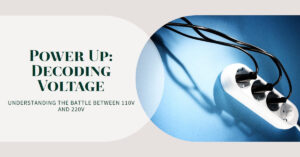Clothes dryers are essential appliances in our homes, providing convenience and efficiency in drying laundry.
However, it’s important to ensure that the voltage requirements of these appliances match the electrical system in your home.
In this article, we will explore whether it is possible to run a 220V clothes dryer on a 110V power supply, the potential risks involved, and alternative options to consider. As a short answer, Attempting to run a 220V clothes dryer on a 110V power supply can result in potential risks, hazards, and damage to both the appliance and the electrical system.
Understanding Voltage Requirements
Voltage ratings play a crucial role in determining the compatibility of household appliances with the electrical system.
While voltage standards vary across countries, most homes in the United States operate on a 110V standard.
Clothes dryers, on the other hand, commonly require a higher voltage, often 220V or 240V, to function optimally.
Can I Run a 220V Clothes Dryer on 110V?
Attempting to run a 220V clothes dryer on a 110V power supply is not recommended. The voltage mismatch poses significant risks and dangers.
The appliance may not function properly, and attempting to force it to run on lower voltage can cause damage to both the dryer and the electrical system in your home. It can lead to overheating, electrical malfunctions, and even potential fire hazards.
Moreover, using a 220V appliance on a lower voltage can violate electrical codes and regulations, compromising safety and insurance coverage.
It’s crucial to understand that manufacturers design appliances to operate at specific voltage levels for optimal performance and safety.
Read also my comprehensive article: The Dangers of Running a 220V Dryer on 110V.
Alternatives for Using a 220V Dryer on 110V
If you find yourself with a 220V clothes dryer but only have a 110V power supply, there are a few alternatives to consider.
However, it’s important to note that these options have limitations and drawbacks, and it’s always recommended to consult a professional electrician before making any modifications.
One option is to hire a professional electrician to modify your electrical system, installing a dedicated 220V circuit for the dryer.
This approach can be expensive and may require significant changes to your home’s wiring, breaker panel, and outlets. Additionally, it’s crucial to ensure compliance with local electrical codes and regulations.
Another option is to use a voltage converter or transformer. These devices can convert the 110V power supply to 220V, allowing you to use the dryer.
However, it’s important to choose a converter or transformer with sufficient capacity to handle the power requirements of the dryer.
Keep in mind that voltage converters can be expensive, and bulky, and may introduce additional complexity and potential risks.
Evaluating the Feasibility and Cost-Effectiveness
Before considering any modifications or purchasing a voltage converter, it’s essential to assess the feasibility and cost-effectiveness of these options.
Consulting with a professional electrician is crucial in evaluating your electrical system’s compatibility with a 220V clothes dryer and estimating the expenses involved in modifications or converter installation.
Safety Precautions and Guidelines
When dealing with electrical appliances, safety should always be a top priority. It’s imperative to follow the manufacturer’s instructions and guidelines regarding voltage requirements and usage.
Additionally, ensure that the dryer is properly grounded and that all electrical connections are secure to minimize the risk of electrical hazards and fires.
Considerations for Upgrading Electrical System
If you frequently encounter situations where you need to use high-voltage appliances, upgrading your electrical system to support a 220V power supply may be worth considering.
However, this decision should be made after careful evaluation of the need, cost, and complexity of the upgrade.
Consulting professionals is essential for proper installation and adherence to electrical codes and regulations.
Exploring Alternative Dryer Options
As an alternative to using a 220V dryer on a 110V power supply, you can explore other options that are compatible with the lower voltage.
There are dryers specifically designed to operate on 110V power, which can be a suitable choice for homes with such electrical systems.
Additionally, gas-powered dryers and heat pump dryers are alternative options that can provide efficient drying while bypassing the voltage compatibility issue.
Conclusion
Running a 220V clothes dryer on a 110V power supply is not recommended due to the potential risks, dangers, and violation of electrical codes.
It is crucial to ensure that the voltage requirements of your appliances match the electrical system in your home to ensure proper functioning, safety, and compliance.
If faced with a voltage mismatch, consult a professional electrician to explore viable alternatives and make informed decisions regarding your laundry appliance options.

